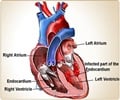Scientists have identified a novel mechanism that contributes to heart failure. From the University of Western Ontario, they used a unique genetically-modified mouse model
Scientists have identified a novel mechanism that contributes to heart failure. From the University of Western Ontario, they used a unique genetically-modified mouse model to discover the new mechanism. //
It showed that decreased release of the neurotransmitter acetylcholine, a chemal messenger, which slows cardiac activity, contributes to heart failure.Cardiac output is controlled using two opposing divisions of the autonomic nervous system: the sympathetic nervous system, which boosts the heart rate and the parasympathetic system, which slows it by releasing acetylcholine.
"Lots of people have studied the system that increases the heart rate and that has been the hallmark; we know there's an increase in the sympathetic nervous system in people who have heart failure," said Robert Gros, a cardiovascular researcher and assistant professor in the Departments of Physiology and Pharmacology and Medicine at Western's Schulich School of Medicine and Dentistry.
"What we're now showing with this mouse model is that even if you have a functional sympathetic nervous system, if the other system, the parasympathetic system is dysfunctional or works less optimally than normal, you still end up with a sick heart.
"This opens up a whole new avenue that people have missed in the past," he added.
The researchers genetically modified a line of mice with decreased secretion of acetylcholine originally for use in studying neuronal function in diseases such as Alzheimer's.
Advertisement
"There are other mouse and rat models of heart failure, but what we haven't had before is a model where we specifically target this chemical messenger, acetylcholine," said Marco Prado, a professor in the Departments of Physiology and Pharmacology and Anatomy and Cell Biology.
Advertisement
"Although it requires further study, this could provide a novel opportunity for treating failing hearts," Prado added.
The drug, Pyridostigmine, is currently approved for use in treating certain cases of muscle weakness.
Source-ANI
TRI














